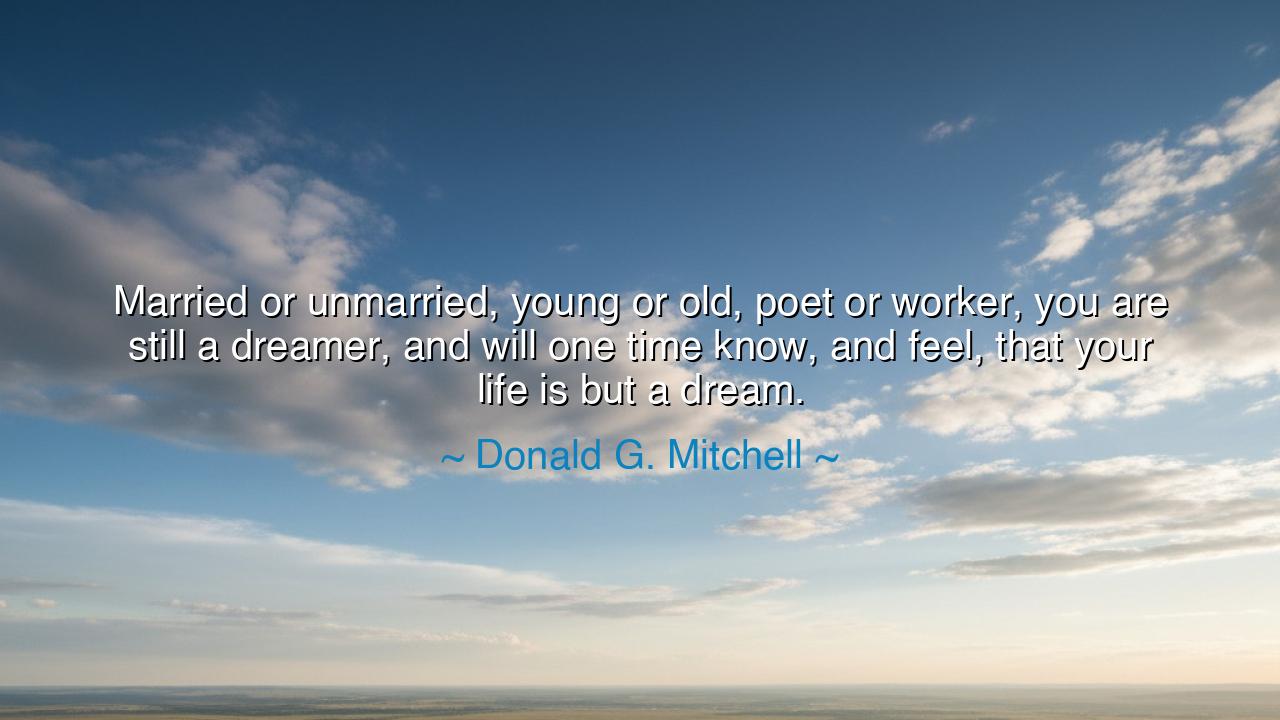
Married or unmarried, young or old, poet or worker, you are still
Married or unmarried, young or old, poet or worker, you are still a dreamer, and will one time know, and feel, that your life is but a dream.






When Donald G. Mitchell wrote, “Married or unmarried, young or old, poet or worker, you are still a dreamer, and will one time know, and feel, that your life is but a dream,” he was not speaking merely in poetry, but in prophecy. His words rise from that timeless current of thought which whispers that life itself is both real and unreal—real in its living, yet fleeting as mist when touched by the dawn of eternity. In this, Mitchell joins the company of sages and mystics who saw through the veil of the world and understood that dreaming is not the act of sleep, but the essence of being. Every life, however ordinary or grand, unfolds as a dream, woven from desires, memories, and visions that vanish as swiftly as they are born.
The meaning of this quote is deep as the sea: whether one lives in youth or age, in passion or labor, all souls are bound by the same mysterious thread of imagination. The dreamer is not only the poet, but the farmer who looks at his field and imagines harvest, the mother who envisions her child’s future, the worker who builds what he cannot yet see complete. To be human is to dream, and to dream is to live. The visible world is but the shadow of the invisible, and each action, each hope, springs first from the mind’s silent theatre. When Mitchell says, “you will one time know,” he hints at the awakening that comes to all—that moment when one looks back on life and sees that it has flowed like a vision through the fingers of time.
This idea has been echoed by philosophers since the dawn of thought. The ancient Chinese sage Zhuangzi once dreamed he was a butterfly, and when he awoke, he wondered if he was truly Zhuangzi dreaming of being a butterfly—or a butterfly dreaming of being Zhuangzi. The line between dream and reality, he realized, is finer than the edge of a petal. Mitchell’s words breathe the same truth: that the boundaries we draw—between work and art, youth and age, waking and sleep—are illusions. The dreamer in us never dies; it simply takes new forms as life unfolds.
Consider the life of Martin Luther King Jr., whose immortal words, “I have a dream,” became the spark that lit a nation’s conscience. He was not a poet by profession, nor a dreamer in repose, but a man of action whose dream transcended his time. His dream was not fantasy—it was the revelation of what humanity might become. Through his faith, labor, and sacrifice, he showed that to dream is not to escape reality, but to transform it. His life—like all great lives—was itself a dream, one that awakened millions to their own divine potential.
Mitchell’s message carries both comfort and challenge. If life is a dream, then its sorrows, too, are not final. Grief, failure, loss—all are passing shadows upon the wall of eternity. The wise learn to hold these lightly, knowing that the pain of today is part of a larger vision yet unseen. Yet the same truth demands that we live our dream fully, for it is ours alone. The dreamer who slumbers through his days, content to let life drift by, will awaken at the end with regret. But the one who shapes his dream with courage and love will leave behind a vision that continues to breathe in the hearts of others.
To live as a dreamer is not to deny reality—it is to see deeper into it. The material world is clay; the dream is the sculptor’s hand. The cities we walk, the songs we sing, the very nations we build were first imagined in the quiet chambers of human thought. The dream is the root, and the world is its fruit. Every act of creation—whether of art, justice, or compassion—is the dreamer at work within the eternal dream of life.
The lesson, then, is both gentle and profound: remember that you are a dreamer, no matter your station or age. Do not lose wonder in the face of labor, nor courage in the face of illusion. Tend your dreams as one tends sacred fires; feed them with learning, reflection, and faith. Yet also remember that life itself is transient—a dream within a dream, as the poet Poe once wrote. Therefore, be kind, be curious, and live with reverence.
So, my child, when you wake each morning, see the day not as mere routine but as part of the grand dream of existence. Play your role with sincerity, love deeply, imagine boldly, and fear not the passing of time. For one day, when the last curtain falls, you will awaken into the greater reality that Mitchell foresaw—and you will know, as he did, that your life was but a dream, yet one that shimmered with eternal meaning.






AAdministratorAdministrator
Welcome, honored guests. Please leave a comment, we will respond soon